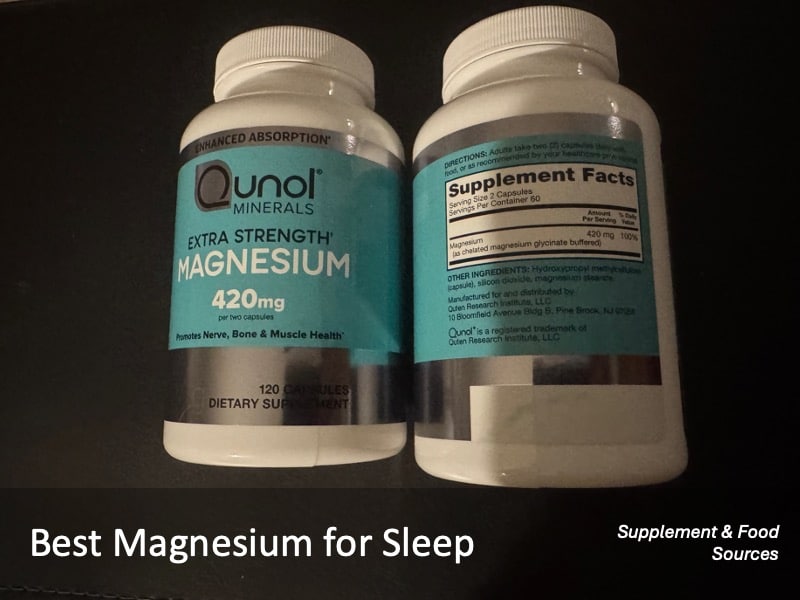Best Magnesium for Sleep (Best Supplement & Food Sources)
Taking magnesium for sleep is an excellent, natural way to support and improve your sleep cycle. However, choosing the best magnesium for sleep is somewhat complicated because of all the types of magnesium supplements to choose from.
Magnesium is a key mineral involved in over 300 enzymatic reactions in the body, including muscle relaxation, nervous system regulation, and melatonin production—all essential for deep, restorative sleep.
Yet, nearly two-thirds of people in Western countries fail to meet their daily magnesium needs, leading to sleep disturbances, stress, and muscle tension (Schwalfenberg & Genuis, 2017).
I’ve personally used magnesium supplements for years to support better sleep, reduce muscle cramping, and manage motor tics from Tourette syndrome.
Through research and personal experience, I’ve found the best magnesium for sleep, found out that not all magnesium supplements work equally well for sleep, and learned that some forms are significantly more bioavailable and effective than others.
This article explores the best magnesium for sleep, its benefits, and how to choose the right magnesium supplement to improve your rest.
If you are simply looking for a recommendation on the best magnesium supplement for sleep, I suggest Qunol Magnesium Glycinate (420mg).
Last update on 2025-07-11 / This article includes affiliate links/Images via Amazon Product Advertising API. I may earn commissions on purchases made through these links.
How Magnesium Supports Sleep
Magnesium plays a direct role in sleep quality by calming the nervous system, relaxing muscles, and supporting melatonin production.
Here’s how it works:
Magnesium Regulates the Nervous System
Magnesium helps regulate the nervous system as it activates gamma-aminobutyric acid (GABA) receptors in the brain.
GABA is a neurotransmitter responsible for reducing brain activity and promoting relaxation.
Low magnesium levels are associated with increased anxiety, restlessness, and difficulty falling asleep (Rawji et al., 2024).
Supports Melatonin Production
Melatonin is the hormone responsible for regulating the sleep-wake cycle.
Magnesium influences melatonin production by supporting enzymatic reactions that trigger its release.
Research suggests that magnesium supplementation can enhance melatonin synthesis, leading to deeper, more restorative sleep.
Reduces Cortisol & Stress Levels
High cortisol levels, often caused by stress and anxiety, can keep you awake at night. Magnesium helps lower cortisol and support adrenal function, making it easier to relax and unwind before bed.
Relaxes Muscles & Prevents Restlessness
If you experience muscle cramps, twitching, or restless legs at night, magnesium deficiency could be to blame.
Magnesium plays a crucial role in muscle contraction and relaxation, preventing involuntary movements that disrupt sleep.
Best Types of Magnesium for Sleep
Not all magnesium supplements are created equal.
Some forms are highly absorbable and effective for sleep, while others are less bioavailable or more likely to cause digestive issues.
Here are the best forms of magnesium for sleep:
Magnesium Glycinate – Best for Relaxation & Deep Sleep
Magnesium glycinate is the best magnesium for sleep because it is highly bioavailable and gentle on digestion.
It combines magnesium with glycine, an amino acid that promotes calmness and relaxation by supporting GABA activity.
- Best for: Stress reduction, insomnia, muscle relaxation
- Highly absorbable & well-tolerated
- Minimal digestive side effects
Magnesium L-Threonate – Best for Brain Health & Sleep Quality
Magnesium L-Threonate is second on my list of the best types of magnesium for sleep because it is one of the only forms that crosses the blood-brain barrier, making it ideal for cognitive function and sleep. It enhances memory, learning, and relaxation, promoting a more restful night’s sleep (Hausenblas et al., 2024).
- Best for: Mental clarity, deep sleep, reducing nighttime anxiety
- Supports long-term brain health
Magnesium Malate – Best for Muscle Recovery & Sleep Support
Magnesium Malate is a great magnesium for sleep for athletes and those who struggle with muscle pain or fatigue. While it provides mild energy support during the day, it also relaxes muscles and reduces cramping at night, improving sleep quality.
- Best for: People with muscle soreness, athletes, chronic fatigue
- Supports ATP production for energy and recovery
Magnesium Taurate – Best for Heart Health & Sleep Regulation
Magnesium Taurate combines magnesium with taurine, an amino acid that helps regulate the nervous system and reduce stress. This form of magnesium for sleep is beneficial for those with high blood pressure, anxiety, or cardiovascular concerns that may affect sleep.
- Best for: Heart health, stress relief, nervous system regulation
Magnesium Citrate – Best for Digestion & Occasional Sleep Support
Magnesium Citrate is a highly absorbable form that also works as a gentle laxative. While it can help with relaxation and sleep, it’s best suited for those who also need digestive support.
- Best for: People with constipation, occasional sleep troubles
- Caution: May cause loose stools in higher doses
Magnesium-Rich Foods That Improve Sleep

Before turning to supplements, it’s important to get as much magnesium as possible from whole foods. Foods rich in magnesium also provide fiber, antioxidants, and essential nutrients that enhance absorption.
Some of the best magnesium-rich foods for sleep include:
- Pumpkin Seeds (156 mg per ounce) – One of the highest sources of magnesium
- Chia Seeds (111 mg per ounce) – Rich in magnesium, fiber, and omega-3s
- Almonds (80 mg per ounce) – Great for snacking before bed
- Spinach (78 mg per ½ cup, cooked) – Loaded with magnesium and iron
- Black Beans (60 mg per ½ cup, cooked) – Supports blood sugar and relaxation
- Bananas (32 mg per medium banana) – Provides magnesium and potassium for muscle relaxation
Tip: Eating a small handful of nuts or seeds before bed can naturally increase magnesium levels and promote better sleep.
Optimal Magnesium Dosage for Sleep
The Recommended Daily Allowance (RDA) for magnesium is:
- Men (31+ years): 420 mg/day
- Women (31+ years): 320 mg/day
- Pregnant Women: 350–400 mg/day
For sleep support, most people benefit from a supplement dosage of 200–400 mg per day, preferably taken 30–60 minutes before bed.
Can You Take Too Much Magnesium?
While magnesium from food is not a concern, excessive supplementation (over 500 mg/day) can lead to digestive issues like diarrhea.
The upper tolerable intake level (UL) is set at 350 mg/day for supplements, but research suggests that higher doses (up to 500-600 mg/day) are well tolerated in most individuals (Costello et al., 2023).
To avoid side effects, start with a lower dose (200-300 mg/day) and adjust as needed.
Best Magnesium Supplements for Sleep: My Top Picks
With so many magnesium supplements on the market, finding the right one for sleep can be overwhelming.
Through my experience and research, two options stand out as the best choices for improving sleep quality:
- Qunol Magnesium Glycinate (420mg) – Best for high absorption and affordability
- Rootcha Magnesium & Zinc – Best for magnesium-zinc synergy and overall mineral support
Both supplements offer superior bioavailability, meaning they are easily absorbed and used by the body, making them ideal for relaxation, stress relief, and deeper sleep.
Qunol Magnesium Glycinate (420mg)

Qunol Magnesium Glycinate is my top pick for sleep because it provides 420mg of highly bioavailable magnesium glycinate at an affordable price.
Magnesium glycinate is one of the most effective forms for promoting relaxation and restful sleep, as it combines magnesium with glycine—an amino acid that supports GABA activity in the brain.
This supplement is also gentle on digestion, unlike magnesium citrate or oxide, which can cause digestive discomfort or laxative effects.
Why Qunol Magnesium Glycinate Is Great for Sleep:
- Highly absorbable magnesium glycinate form
- 420mg per serving – Meets daily magnesium needs
- Supports deep sleep, relaxation, and stress relief
- No digestive side effects like diarrhea
- Affordable compared to similar high-quality options
If you’re looking for a high-quality, affordable magnesium supplement that directly targets sleep and stress, Qunol Magnesium Glycinate is an excellent choice.
Last update on 2025-07-11 / This article includes affiliate links/Images via Amazon Product Advertising API. I may earn commissions on purchases made through these links.
Rootcha Magnesium & Zinc
Rootcha Magnesium & Zinc is another top-tier magnesium for sleep, especially for those who want more than just magnesium.
This supplement combines magnesium bisglycinate with bioavailable zinc, creating a synergistic formula that supports both sleep and immune function.
Taking zinc for sleep is also effective as zinc plays a key role in melatonin production, the hormone that regulates the sleep-wake cycle.
When combined with magnesium, it enhances sleep quality, reduces stress, and supports muscle relaxation.
Why Rootcha Magnesium & Zinc Is Great for Sleep:
- Contains both magnesium bisglycinate & zinc for extra benefits
- Supports melatonin production for better sleep regulation
- Highly bioavailable formula – Easy for the body to absorb
- Great for immune function and overall health
- No unnecessary fillers or additives
If you want a well-rounded mineral supplement that not only enhances sleep but also supports immune health, Rootcha Magnesium & Zinc is an excellent choice.
Last update on 2025-07-11 / This article includes affiliate links/Images via Amazon Product Advertising API. I may earn commissions on purchases made through these links.
Final Thoughts: The Best Magnesium for Sleep
If you struggle with insomnia, stress, or muscle restlessness, taking magnesium for sleep can be a natural and effective solution.
Among the best magnesium supplements for sleep, magnesium glycinate stands out for its high absorption, relaxation benefits, and minimal side effects.
For those looking for added cognitive benefits, Magnesium L-Threonate may be the best magnesium for sleep.
If muscle recovery is your goal, Magnesium Malate might be the best magnesium for sleep fr you.
Prioritizing magnesium-rich foods like nuts, seeds, leafy greens, and legumes will further support sleep quality and overall health.
Whether through diet or supplementation, getting enough magnesium is one of the simplest ways to improve your sleep and well-being.
This website does not provide medical advice. This website site does contain affiliate links, and purchases may earn a commission.
Read my Medical Disclaimer, Review Disclaimer, and Publishing Policies for more details. Use of this site indicates acceptance of these terms.





